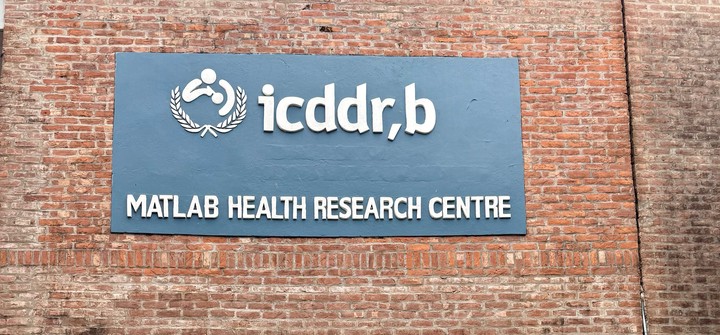IMPROVE_LIFE
Content:
Publications and presentations
Project description
Investigate maternal and paternal risk factors for violence during pregnancy: lasting impact for everyone - IMPROVE_LIFE
You can find the full project overview in Bengali here.
Project background:
Intimate partner violence (IPV) is a recognized human rights, development, and public health issue. Nearly one in three women globally are estimated to have experienced physical and/or sexual violence by their partner during their lifetime (Sardinha 2022). One of the times in life when women are believed to be spared from violence is pregnancy, a period when the well-being of the women and their unborn child is often prioritized. Yet, the reality may be different. Worldwide, the prevalence of physical intimate partner violence during pregnancy ranges from 1 to 28 percent. One in four women abused during pregnancy report that the violence was directed at their abdomen and 90% of the perpetrators were the child’s father (Devries 2010).
Violence in pregnancy has profound consequences for women and children. Short-term health effects for women include injuries, antenatal depression, and negative pregnancy outcomes, such as hypertension and miscarriage, while adverse social effects are isolation, stigma, increased financial stress, and lack of family support due to partner’s controlling behavior (Hill 2016). For children, violence during pregnancy is associated with low birth weight, lack of breastfeeding, and nutritional deficits in the short term (Normann 2020). Emerging evidence also points to long-term consequences directly linked to violence during pregnancy for children, such as attention deficits, poor nutritional outcomes, and violent parental disciplining (Flach 2011). Pregnancy provides an invaluable opportunity to intervene to prevent and address violence, yet we are still limited in our knowledge of this particular form of violence and how to intervene.
Study setting and aims:
IMPROVE_LIFE aims to understand the risk and mediating factors to mitigate intergenerational transmission of violence during pregnancy and its short and long-term health and social effects. The project uses an interdisciplinary, multi-methods research approach that integrates new and existing cohort survey data with clinically collected biomarkers, pooled analyses and qualitative, participatory data.
Primary data is being collected in Matlab, rural Bangladesh from a birth cohort study that includes women and their now adult children in Bangladesh. This cohort study will allow investigating the short- and long-term and intergenerational effects of intimate partner violence during pregnancy, including biomedical pathways. Key emerging pathways will be then tested through secondary analysis of an existing cohort study in the United Kingdom, a high-income country
Benefit sharing and impact:
We aim to inform national and international policy and practice to prevent and address violence during pregnancy. Through close partnership with local key stakeholders and the research teams long-standing engagement with international consortiums and policy networks, we will timely integrate emerging knowledge into prevention and response initiatives to tackle violence against women, and will thereby, on the long run, improve lives.
Funding:
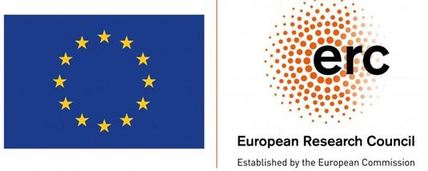
Funded by the European Union. Views and opinions expressed are however those of the author(s) only and do not necessarily reflect those of the European Union or the European Research Council Executive Agency. Neither the European Union nor the granting authority can be held responsible for them.
This work is supported by ERC grant IMPROVE_LIFE, project No. 101124718.
References:
- Devries, K. M., S. Kishor, H. Johnson, H. Stöckl, L. J. Bacchus, C. Garcia-Moreno and C. Watts (2010). "Intimate partner violence during pregnancy: analysis of prevalence data from 19 countries." Reproductive Health Matters 18(36): 158-170.
- Flach, C., M. Leese, J. Heron, J. Evans, G. Feder, D. Sharp and L. Howard (2011). "Antenatal domestic violence, maternal mental health and subsequent child behaviour: a cohort study." BJOG: An International Journal of Obstetrics & Gynaecology 118(11): 1383-1391.
- Hill, A., C. Pallitto, J. McCleary-Sills and C. Garcia-Moreno (2016). "A systematic review and meta analysis of intimate partner violence during pregnancy and selected birth outcomes." International Journal of Gynecology & Obstetrics 133(3): 269-276.
- Normann, A. K., A. Bakiewicz, F. K. Madsen, K. S. Khan, V. Rasch and D. S. Linde (2020). "Intimate partner violence and breastfeeding: a systematic review." BMJ Open 10(10): e034153.
- Sardinha, L., M. Maheu-Giroux, H. Stöckl, S. R. Meyer and C. García-Moreno (2022). "Global, regional, and national prevalence estimates of physical or sexual, or both, intimate partner violence against women in 2018." The Lancet 399(10327): 803-813.nach oben
Work packages
To overcome the consequences of this public health issue, IMPROVE_LIFE has five objectives that are processed in five different work packages:
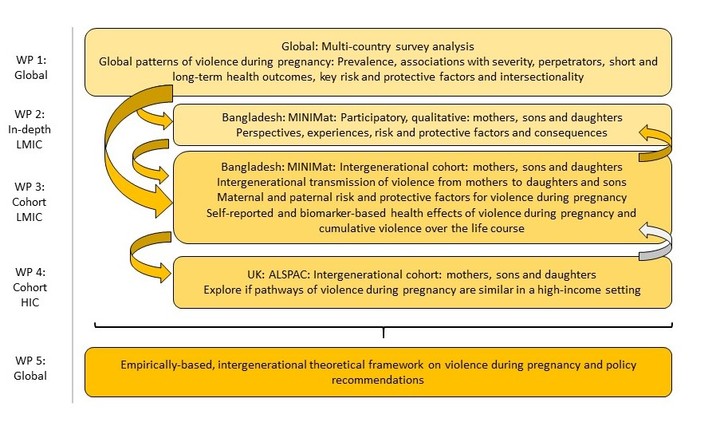
Work package 1:
- Aim: Investigating the short- and long-term social and health associations of violence during pregnancy on women and on their male and female children and establishing that violence during pregnancy is an indicator of severe violence during women’s lifetime
- Method: Multi-country analysis of the Demographic and Health survey (DHS) data from 56 countries (https://dhsprogram.com/)
Work package 2: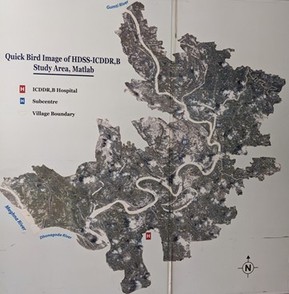
- Aim: Exploring mothers’, sons’ and daughters’ perspectives, experiences, risk and protective factors and consequences of violence during pregnancy.
- Method: Key informant interviews, daily routine and mobility maps, photovoice exercises, and qualitative in-depth interviews with mothers, daughters, and sons
Work package 3:
- Aim: Exploring the maternal and paternal risk and protective factors for the intergenerational transmission of violence during pregnancy as well as self-reported and biomarker-based health effects of violence during pregnancy and cumulative violence over the life course
- Method: Standardized survey questionnaire informed by Work package 1, Work package 2, and biomarkers
Work package 4:
- Aim: Exploring if pathways for violence during pregnancy established in Matlab, Bangladesh are similar to those found in the United Kingdom.
- Methods: Utilizing the pathways and trajectories established in work package 3 to inform a secondary analysis of the Avon Longitudinal Study of Parents and Children (ALSPAC) study (https://www.bristol.ac.uk/alspac/)
Work package 5:
- Aim: Generating evidence on the global applicability of established pathways explaining violence during pregnancy
- Method: Synthesizing findings will be based on innovative and robust approaches ranging from meta-ethnographic to meta-analysis synthesis methods to develop an empirically tested theoretical framework with key theories and concepts from existing distinct disciplines which have been integrated and tested across work packages 1-4.
nach oben
Team
IMPROVE_LIFE is led by Ludwig- Maximilians-Universität (LMU) Munich in close collaboration with International Centre for Diarrhoeal Disease Research, Bangladesh (icddr,b).
Project PI's:
- Prof. Dr. Heidi Stöckl (LMU)
- Dr. Ruchira Tabassum Naved (icddr,b)
Team members:
- Dr. Rubhana Raqib
- Md. Mahfuz Al Mamun, MSc
- Jannatul Ferdous Antu, MSc
- Aloka Talukder, MSS
- Rebecca Brambilla, MSc
- Joanna Krajewska, MSc
- Dr. Reshmi Mukerji
Interns and students:
- Justine Rheinemann
PhD and master’s thesis topics
- “Measuring the impact of domestic violence against women on trajectories of child nutrition using life-course and intergenerational perspectives” by Jannatul Ferdous Antu
- “Understanding the impact of social norms and women’s empowerment on intimate partner violence against women” by Joanna Krajewska
Collaborators:
- Dr. Shirin Ziaei, Uppsala University
Ethics/ Advisory board:
- Prof. Rachel Jewkes, South African Medical Research Councilnach oben
MINIMat cohort
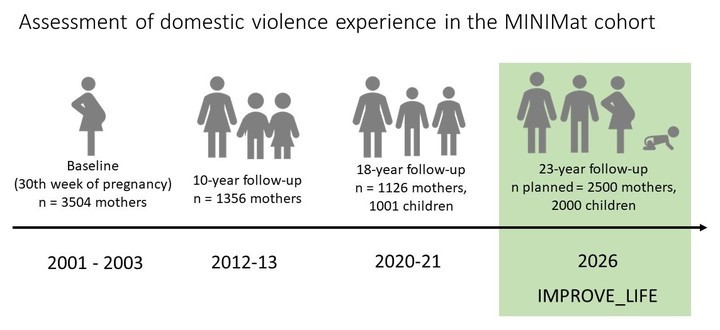
IMPROVE_LIFE builds on the longitudinal cohort resulting from the maternal and infant nutrition intervention (MINIMat) trial run by the International Centre for Diarrhoeal Dis-ease Research, Bangladesh (icddr,b).
The original MINIMat trial is a population-based randomized control trial in Matlab, Bangladesh that randomized food and micronutrient supplementation to pregnant women in Matlab, rural Bangladesh (Persson 2012, Arifeen 2018). The trial examined the effects of prenatal food, micronutrient supplementation and exclusive breastfeeding on children’s birth weight, growth, morbidity, mortality, pre-pubertal and pubertal nutritional and health indicators but also examined social determinants of health, e.g., women’s empowerment, stress and domestic violence experiences of pregnant women. The initial MINIMat trial ran from 2001 to 2003 and mothers of the 3,267 singleton live births were regularly followed up for 2 years and again at children’s ages of 5, 10, 12-14 and 18. MINIMat is embedded in the Health and Demographic Surveillance System run by icddr,b in the study site since 1966.
Upon recruitment, women were interviewed during pregnancy and in subsequent years about their physical and mental health, nutrition, empowerment, and violence in their homes, including physical, sexual and emotional violence during pregnancy (Ziaei 2016). Biological samples taken from women and their children included height, weight, blood pressure, cortisol levels, and toxicology, in addition to regular ultrasounds during pregnancy (Arifeen 2018).
MINIMat data are unique as they are longitudinal and follow a cohort of not only children but also their mothers and households. These data are essential for understanding causal relationship between social determinants and health and nutritional outcomes.
IMPROVE_LIFE will build on this data and expand it with a 23-24 years follow-up that focuses on intergenerational transmission of violence during pregnancy, violence experiences, and its short- and long-term health and social effects.
Key MINIMat cohort publications:
- Arifeen, S.E., E.-C. Ekström, E. A. Frongillo, J. Hamadani, A. I. Khan, R. T. Naved, A. Rahman, R. Raqib, K. M. Rasmussen and K. E. Selling (2018). "Cohort profile: the maternal and infant nutrition interventions in Matlab (MINIMat) cohort in Bangladesh." International Journal of Epidemiology 47(6): 1737.
- Persson, L. Å., S. Arifeen, E.-C. Ekström, K. M. Rasmussen, E. A. Frongillo and M. S. Team (2012). "Effects of prenatal micronutrient and early food supplementation on maternal hemoglobin, birth weight, and infant mortality among children in Bangladesh: the MINIMat randomized trial." JAMA 307(19): 2050-2059.
MINIMat publications related to violence against women:
- Antu JF, Hasan SMT, Naved RT (2025). Is domestic violence a risk factor for women’s emotional distress in the long run? Analysis of MINIMat longitudinal data from Matlab, Bangladesh. BMJ Glob Health 2025;10:e017209. doi:10.1136/bmjgh-2024-017209.
- Naved, R. T., Antu, J. F., Parvin, K., & Ziaei, S. (2023). Multi-level analysis of the determinants of physical domestic violence against children using longitudinal data from MINIMat mother–child cohort in Bangladesh. Frontiers in public health, 11, 1185130.
- Ziaei, S., Antu, J. F., Mamun, M. A., Parvin, K., & Naved, R. T. (2023). Factors Associated With Domestic Violence Against Women at Different Stages of Life: Findings From a 19-Year Longitudinal Dataset From the MINIMat Trial in Rural Bangladesh (2001–2020). Journal of interpersonal violence, 38(21-22), 11768-11789.
- Ziaei, S., Naved, R. T., Rahman, S. M., Rahman, A., & Ekström, E. C. (2021). Maternal experience of domestic violence before and during pregnancy and children's linear growth at 15 years: Findings from MINIMat trial in rural Bangladesh. Maternal & Child Nutrition, 17(3), e13175.
- Ziaei, S., Naved, R. T., Rahman, A., Raqib, R., & Ekström, E. C. (2019). Maternal experience of domestic violence, associations with children’s lipid biomarkers at 10 years: findings from MINIMat study in rural Bangladesh. Nutrients, 11(4), 910.
- Frith, A. L., Ziaei, S., Naved, R. T., Khan, A. I., Kabir, I., & Ekström, E. C. (2017). Breast-feeding counselling mitigates the negative association of domestic violence on exclusive breast-feeding duration in rural Bangladesh. The MINIMat randomized trial. Public health nutrition, 20(15), 2810-2818.
- Ziaei, S., A. L. Frith", E.-C. Ekström and R. T. Naved (2016). "Experiencing lifetime domestic violence: associations with mental health and stress among pregnant women in rural Bangladesh: the MINIMat Randomized Trial." PLoS one 11(12): e0168103.
- Åsling-Monemi, K., Naved, R. T., & Persson, L. Å. (2009). Violence against women and the risk of fetal and early childhood growth impairment: a cohort study in rural Bangladesh. Archives of disease in childhood, 94(10), 775-779.
- Åsling-Monemi, K., Naved, R. T., & Persson, L. Å. (2009). Violence against women and increases in the risk of diarrheal disease and respiratory tract infections in infancy: a prospective cohort study in Bangladesh. Archives of pediatrics & adolescent medicine, 163(10), 931-936.nach oben
Publications and presentations
Conference presentations
ISRA, Munich, 2024
“Is domestic violence during pregnancy a marker for severe domestic violence against women later in life?” Heidi Stöckl, Jannatul Ferdous Antu, Mahfuz Al Mamun, Ruchira Tabassum Naved
https://www.congresscenter.philosophie.uni-muenchen.de/kongresse/isra/scientific-program/program/day-2/index.html
PhD-program presentation LMU, Munich, 2024
“Measuring the impact of domestic violence against women on trajectories of child
nutrition using life-course and intergenerational perspectives.” Jannatul Ferdous Antu
SVRI Forum, Cape Town, 2024
“Is domestic violence during pregnancy a marker for severe domestic violence against women later in life?” Heidi Stöckl, Jannatul Ferdous Antu, Mahfuz Al Mamun, Ruchira Tabassum Naved
https://www.svriforum2024.org/wp-content/uploads/2024/11/Heidi-Stockl-PS6.pdf
“Factors associated with domestic violence against women at different stages of life: MINIMat longitudinal study in rural Bangladesh (2001-2020)”. Shirin Ziaei, Jannatul Ferdous Antu, Mahfuz Al Mamun, Kausar Parvin, Ruchira Tabassum Naved. https://www.svriforum2024.org/wp-content/uploads/2024/11/Mahfuz-Al-Mamun-updated_PS3.pdf
“Risk & protective factors for physical violence against children (VAC): Rural Bangladesh.” Ruchira Tabassum Naved, Jannatul Ferdous Antu, Kausar Parvin, Shirin Ziaei. https://www.svriforum2024.org/wp-content/uploads/2024/11/Mahfuz-Al-Mamun.pdfnach oben


